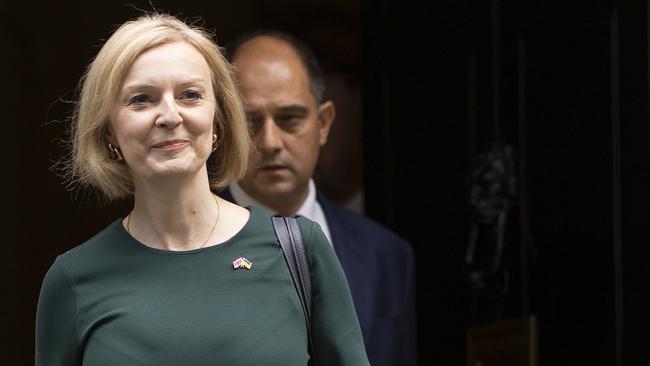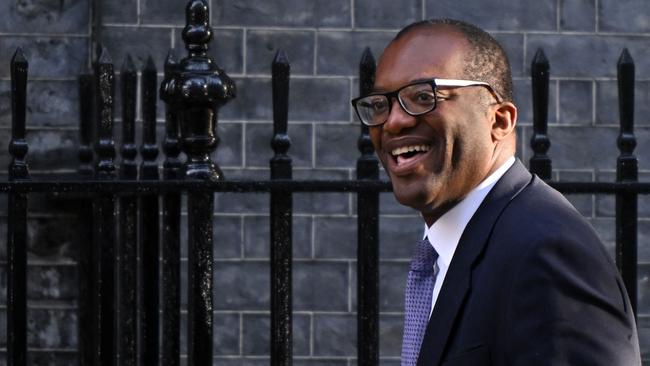UK’s Liz Truss era won’t be a disaster, just a mess
Even if the British PM thinks she sees a clear path to growth, her lack of skills, strategy or Tory support will hobble her.

The ability to see pattern in seemingly random data is a distinguishing mark of homo sapiens. It enables us to predict, helps us to makes sense of the world, alerts us to opportunity and danger. So insistent is the itch to spot design in apparent chaos that our ancestors could conjure up scorpions, bears and crabs in the disorder of the night sky. Show us dots, and our imaginations strain to join them up.
And so it is with politics. Reluctantly your columnist must confess that, reading the runes as what is in effect a new government takes office, he discerns (in Churchill’s phrase) “no theme in this pudding”.
I say “reluctantly” because grand statements flow more easily from a columnist’s pen. Easier to write that Liz Truss’s administration will be a triumph/disaster/quantum leap/total flop/bold new chapter/humiliating retreat … than that it’s just going to be an inconclusive muddle. Hard to write that with clarity or vigour; but I must try.
Sometimes the dots do join up and make a meaningful picture and occasionally in my columnist’s career I thought I’d seen it; but experience is teaching me that you need to stand so much further back – perhaps with the perspective of a century or more – before you can see.
It may be that from the other end of this century we see Britain rather as we see 20th-century Argentina now: a nation that had once been one of the world’s richest, struggling to come to terms with its relative decline, as populist politics feasts on the decay, promising the impossible, distracting the voters with small wars and squabbles, blaming failure on conspiracies and fifth-columns, debauching the currency and dangling impossible dreams to keep the middle classes from banging saucepans in the streets beneath ministers’ windows. But that’s not analysis, it’s prophecy.
For analysis I had planned to join the dots in one of two possible columns I’ve been mulling over this week. I’ve abandoned both but they’re worth summarising because each does suggest a pattern, but the patterns conflict.
The first would be that people like me have perhaps been underestimating Truss; that when she sees a brick wall ("no handouts for the fuel-poor!") she stops just short of walking into it; that if we examine her various and contradictory previous opinions we should recognise a moral flexibility and intellectual agility that’s useful in democratic politics; that she can sometimes be warned off mistakes; and that the lady’s often (thank heavens) for turning and this is cause for relief.
I could claim to see a pattern here: noisy posturing but underlying pragmatism. And there’s a grain of truth in that.
The other and contrary column also contains some truth. Here I’d argue that, discounting the fickleness of her record, there does emerge a consistent core: Truss is a chippy libertarian; she believes in sink-or-swim; her hatred of the nanny state is long-standing, hence her dislike of taxation and of what Margaret Thatcher called “the dead hand of the state”.
She is (I’d have argued) an applause-seeking and populist apostle of freedom. But (I’d have continued) her populism lacks the vital ingredient of popularity, so she’ll come a cropper in the division lobbies and the focus groups, start losing by-elections, and blame failure to reach her El Dorado ("Britannia Unchained") on plots, conspiracies, the civil service, the unions, the media and the BBC. Believe me, these blame-shifting populist tricks do await us.
But in the end, the dots won’t join up.
Triumph or disaster would be interesting; but messing around, far less so, and that’s what’s in store. Failure is likely, but failure ending not in a bang but a whimper. I believe we’re in for a period of stumbling and incoherent government.
There are many reasons.
First, Truss cannot rely on the support of her parliamentary party in either the Commons or the Lords.
Second, she is making unnecessary enemies outside parliament.
Third, beyond warbling about freedom, her thoughts do not cohere into any solid strategy.
Fourth, she lacks the instinct to keep potential critics on board, to compromise and cut deals.
Fifth, the gradient of the era – a time when money is tight and voter insecurity pervasive – is against small-state experimentation, even if in easier times it might have been worth trying.
Today it will look more like grinding the faces of the poor. “They bark of freedom and oppress the free,” wrote the poet John Clare, lamenting the enclosures.
Truss likes the word “freedom” but “freedom for whom?” may become the question.
Lifting the cap on bankers’ bonuses seems a strange decision. Finally, in communication terms especially with the nation as a whole, Truss is not one of nature’s persuaders.
The sacking of Sir Tom Scholar, permanent secretary to the Treasury, was a mistake and she must now realise it, but too late.
Many distinguished voices have been raised in Scholar’s defence in this newspaper and I won’t repeat the testimonials, but to make an enemy of a whole department, overwhelmingly the most important in Whitehall, by snarling noisily about “Treasury orthodoxy” would be a mistake, even if the criticism had truth.

I suspect the sacking of Scholar by Truss and her chancellor, Kwasi Kwarteng, may be traced to personal bad blood. If her cabinet were riding high on the goodwill of the parliamentary party, she might have leeway to settle a few old scores; to ram through a firebrand answer to the Northern Irish protocol question; to shrug off hand-wringing about the poor and push ahead with rewarding success. But only 50 Conservative MPs voted for her in the first round and there exists no cavalry of loyal Trussites to ride to her rescue, so Truss won’t march her party to the cliff’s edge. Commons divisions will be pulled before they are lost. Bold policy proposals will be postponed not abandoned; big initiatives watered down. And slowly an impression will settle not of High Noon, but of a loss of focus and direction. The realisation that Truss’s cornerstone myth – our “unshackled” economy powering us out of debt – was always a mirage will steal gradually upon us. Freedom and growth, which were to join up the dots and give shape to her administration, will go the way of Cameron’s Big Society and May’s rescue of the “just about managing”.
Politics is not so different from most of our own lives: few “aha!” moments, no denouements and mostly just a bit of a muddle. Choosing Truss was a bad mistake but, as with Brexit, we’ll wait in vain for the QED. As royal funerals recede in our rear-view mirror, fog will descend. It is unlikely to clear soon.
The Times



To join the conversation, please log in. Don't have an account? Register
Join the conversation, you are commenting as Logout